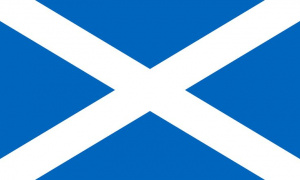Language/Scottish-gaelic/Grammar/Negation
Hi Scottish Gaelic learners! 😊
In this lesson, we will explore Negation in Scottish Gaelic. Negation is putting a negative meaning to a verb or a noun. Negation can be used in different situations, such as negating an action, negating a state, negating a person or negating a thing. We will also learn some cultural information and interesting facts about Scotland. 🏰
Finish this lesson and explore these related pages: Personal pronouns, Questions, Adjectives & Pronouns.
Negating verbs: Negation of Bu and Tha[edit | edit source]
To negate a verb in Scottish Gaelic, we use the particle "cha" followed by the verb without any modification. It must be noted that the use of the negative particle changes depending on the tense of the verb. In general, we use "cha" with the present tense and "cha bhi" with the future tense.
Here are some examples to help you understand better:
| Scottish Gaelic | Pronunciation | English |
|---|---|---|
| Cha toil leam an t-sìde | [xatʃ ˈt̪ɔʎ lɛm ən ˈtʲiːtʃɛ] | I don't like the weather. |
| Cha bhi mi grianach amàireach | [xapʰi mi ˈɡɾʲanəx əˈmaːɾʲəx] | I won't be sunny tomorrow. |
| Chan eil mise a' fuireach ann an Lunnainn | [xan ɛl miʃə a ˈf̪uɾʲəx aːn ən ˈɫ̪unˠəɲ] | I am not living in London. |
Negating noun: Seo, Sin, and Siud[edit | edit source]
To negate a noun in Scottish Gaelic, we use the particle "chan eil" followed by the noun, as in the following examples:
| Scottish Gaelic | Pronunciation | English |
|---|---|---|
| Chan eil seo olc | [xan ɛl ʃɔ ɔlˠ̪k] | This is not bad. |
| Chan eil sin dona | [xan ɛl ʃɪn ˈt̪ɔnə] | That is not terrible. |
| Chan eil siud math | [xan ɛl ʃuːtʃ ˈma] | Those (over there) are not good. |
The particles "seo," "sin," and "siud" are used to indicate the location of things in relation to the speaker. "Seo" is used for objects close to the speaker, "sin" is used for objects close to the listener, and "siud" is used for objects away from both the speaker and the listener.
Interesting facts about Scotland[edit | edit source]
Scotland has a rich cultural heritage that spans centuries. Some interesting facts about Scotland include:
- The national animal of Scotland is the unicorn.
- Scotland is known for its stunning natural landscapes, including the Highlands, the Cairngorms National Park, and the Isle of Skye.
- Edinburgh, the capital of Scotland, is home to one of the largest festivals in the world, the Edinburgh Fringe Festival.
- Gaelic, the language we are learning, is spoken by only 1.1% of the Scottish population, mainly in the northwest of the country.
- Scotland has given birth to many famous people, including the authors Sir Walter Scott and Robert Burns, the inventor Alexander Graham Bell, and the actors Ewan McGregor and James McAvoy.
Dialogue[edit | edit source]
Here is a dialogue to help you understand how to use negation in Scottish Gaelic.
- Person 1: A bheil thu ag iarraidh tì? (Are you wanting tea?)
- Person 2: Chan eil, tapadh leat. (No, thank you.)
- Person 1: Nach eil an aimsir brèagha a-nis? (Isn't the weather beautiful now?)
- Person 2: Chan eil, tha e ràinig. (No, it's raining.)
- Person 1: A bheil na thursan is fheàrr na brògan agad? (Are those shoes better than yours?)
- Person 2: Chan eil, tha mo bhroga nas fheàrr. (No, my shoes are better.)
Practice Exercise[edit | edit source]
Use the following prompts to practice negation in Scottish Gaelic. Translate them into Scottish Gaelic.
- You are not eating.
- They will not be late.
- I don't like coffee.
- This is not a good idea.
- That book is not interesting.
Final thoughts[edit | edit source]
We hope you found this lesson helpful! Negation is a crucial concept in Scottish Gaelic, and it’s important to be familiar with its different forms and usages. To improve your Scottish Gaelic Grammar, you can also use the Polyglot Club website. Find native speakers and ask them any questions!
Sources[edit | edit source]
Other Lessons[edit | edit source]
- How to Use Have
- How to Use Be
- Plurals
- Conditional Mood
- Pronouns
- Questions
- Future Tense
- Adjectives
- Personal pronouns

